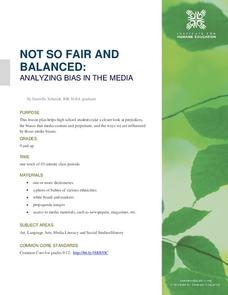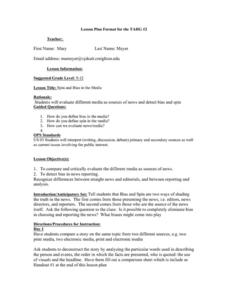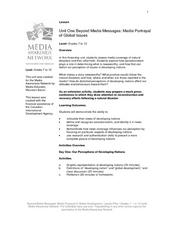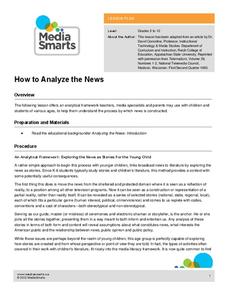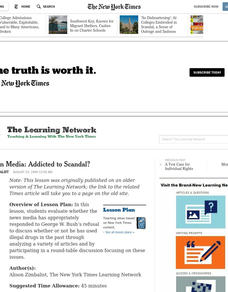Anti-Defamation League
Stereotypes of Girls and Women in the Media
A two-part lesson has scholars researching the stereotypes in portraying women and girls in the media and the impact of these representations. To conclude the lesson, participants write a letter of praise to sources that present positive...
Media Smarts
Bias in News Sources
As young consumers of media, it is important for high schoolers to explore concepts of bias and prejudice, and how they may be present in media. After discussing ideological messages that media can contain, individuals complete a warm-up...
University of the Desert
Fact and Opinion within the Media
How can the media foster cultural misunderstandings? These activities encourage learners to distinguish between fact and opinion in the media
Institute for Humane Education
Not So Fair and Balanced: Analyzing Bias in the Media
Life is not always fair. Who's heard that before? This same concept moves to a larger scale using prejudice and bias. Pupils discuss where prejudice attitudes derive and how they develop throughout life. Reading comprehension...
Social Media Toolbox
Reporting with Social Media
What does it take to create news stories that are both informative and objective? Aspiring journalists walk the line between engagement and activism with lesson 15 of a 16-part series titled The Social Media Toolbox. Grouped pupils...
Facing History and Ourselves
Citizen Watchdogs and the News
To conclude their case study of media coverage of the shooting of Michael Brown by a Ferguson, Missouri, police officer, class members consider the role of citizen watchdogs in a democratic society, develop strategies for combating...
Curated OER
Spin and Bias in the Media
Students compare different types of media. In this media comparison lesson, students will assess the where all types of media gets its information by viewing a video of a news story and critiquing it.
Rockefeller Archive Center
Understanding Mass Media News
In an age of fake news and photoshopped images, it is vital that 21st century learners development the skills they need to evaluate mass media and assess its validity. A great way to launch such a study is with a carefully crafted lesson...
Curated OER
Bias and Crime in Media
Critical thinking and social justice are central themes for this resource on bias and crime in media. The class views and discusses an incisive PSA that highlights assumptions based on race. Small groups read newspaper opinion pieces...
Ontario
Critical Literacy—Media Texts
Media texts convey both overt and implied messages. As part of their study of media, class members analyze the language, form, techniques, and aesthetics in a variety of media texts.
ReadWriteThink
Critical Media Literacy: Commercial Advertising
Commercial advertising—we can't get away from it, but do we realize just how often we are being advertised to? With this lesson, scholars analyze mass media to identify how its techniques influence our daily lives. Learners browse...
Curated OER
Fighting Fake News
Fake news. Alternative facts. Internet trolls. In an age of Newspeak, it's increasingly important to equip 21st century learners with the skills needed to determine the legitimacy of claims put forth on social media, in print, and in...
Southern Poverty Law Center
Analyzing How Words Communicate Bias
Words are powerful ... can your class choose them wisely? Scholars evaluate news articles to discover the concepts of tone, charge, and bias during a media literacy lesson. The resource focuses on recognizing implicit information and...
Curated OER
Beyond Media Messages: Media Portrayal of Global Issues
Take a close look at news reporting techniques and global issues. Begin by creating a graphic representation of developing nations and defining the term. After class discussion, the second day's activities pick up by deconstructing news...
Prestwick House
Understanding Language: Slant, Spin, and Bias in the News
We live in a time of fake news, alternative realities, and media bias. What could be more timely than an activity that asks class members to research how different sources report the same topic in the news?
Museum of Tolerance
Influence of Media
We are bombarded with media images expressly designed to influence viewers. Learning how to analyze the intended effects of these images is essential and the focus of an activity that asks viewers to use the provided questions to guide...
Southern Poverty Law Center
Analyzing Gender Stereotypes in Media
Why might toy advertisers use gender stereotypes to sell their products? Young people think critically about media messages and its role in gender stereotyping with a thought-provoking lesson.
Facing History and Ourselves
How Journalists Minimize Bias
Class members are challenged to write a neutral news story about the events they observe in a short video. After sharing their stories in groups and discussing the different perceptions, the class concludes with a video of journalists...
Curated OER
News Journalism Across the Media: Introduction
Although students are aware of news as information that influences their perceptions of the world, they are often unaware of the various ways to present that information. Encourage them to investigate, discuss, analyze and make valuable...
Newseum
The Press and the Presidency: Friend or Foe? How the President Is Portrayed
In theory, news reports should be fair and unbiased. Young journalists test this theory by selecting a current news story covered by various media outlets about the President of the United States. They then locate and analyze five...
Media Smarts
How to Analyze the News
Teach kids how to watch television, specifically the news, with this creative idea for learners of all ages from the Media Awareness Network. The elementary school plan focuses on presenting news as a story and uses Jon Scieszka's story...
Curated OER
Counteracting Media Stereotyping
Discuss media stereotypes with your emerging consumers. They view a television program to identify gender bias. After discussing the clip as a class, each learner writes a story showing more equitable roles. Or consider having them...
Curated OER
American Media: Addicted to Scandal?
Students examine media coverage of George W. Bush's refusal to answer questions regarding past illegal drug usage in the 1999 campaign. They consider the role of rumor, scandal, audience and relevance in political media coverage.
University of the Desert
Do Journalists Shape or Report the News?
Analyze the presence of negative stereotypes and biased reporting in news media, and how this affects one's understanding of other cultures. Learners read newspaper excerpts and quotes from famous personalities to discuss the power of...





